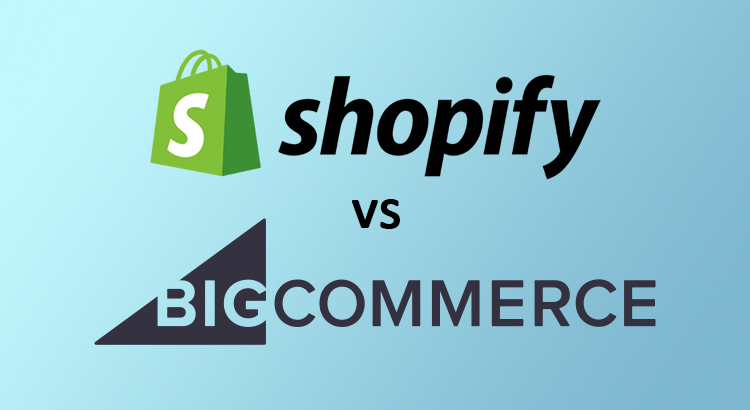The rapid growth of e-commerce has put platforms like Shopify and BigCommerce into the spotlight for creating strong online stores. Deciding between them can be tough because they offer similar features but have some differences. This article aims to provide a comprehensive comparison to help you decide which platform suits your business needs best. Before we dive into the details of Shopify vs BigCommerce, let’s first take a quick look at both platforms.
What is Shopify?
Shopify is a Software-as-a-Service (SaaS) platform that enables businesses to create and manage online stores. It provides a user-friendly interface with a comprehensive set of tools for designing, launching, and scaling e-commerce operations.
Shopify supports multiple sales channels, including web, mobile, social media, and physical retail locations, making it versatile for various business setups.
Related Article: How to Start a Shopify Store for Beginners?
What is BigCommerce?
Similar to Shopify, BigCommerce is also a SaaS-based e-commerce platform that facilitates the creation of customizable online stores. It offers robust features for managing product catalogs, orders, and customer data, alongside extensive customization options.
BigCommerce stands out with its flexibility in customization and scalability, catering well to businesses looking for comprehensive e-commerce solutions.
A Comparative Analysis of BigCommerce vs Shopify
When comparing BigCommerce vs Shopify, several key factors come into play:
1. Usability
BigCommerce boasts a user-friendly interface with a drag-and-drop feature for easy customization of store layouts. This includes adding new pages, products, or categories seamlessly.
It also offers APIs for integrations and a built-in content management repository for efficient product content delivery. However, Shopify edges ahead in usability with its intuitive interface that simplifies store navigation, product additions, and operational optimizations.
Both platforms provide robust flexibility to integrate multiple eCommerce services, but Shopify offers a broader array of integration options.
2. Customization
Both Shopify and BigCommerce provide extensive theme stores offering hundreds of customizable, mobile-responsive themes.
BigCommerce’s drag-and-drop feature is excellent for straightforward modifications, though more complex changes may require expertise from a BigCommerce development partner due to limitations in font changes.
Shopify excels in customization with a versatile theme editor that allows finer adjustments in fonts, colors, and module selections, catering to precise brand messaging needs.
3. Apps, Plugins, and Integrations
BigCommerce supports over 1200 applications and plugins, facilitating functionalities like shipment tracking, customer behavior analysis, and personalized shopping experiences.
Shopify surpasses this with more than 8000 apps, offering a broader spectrum of out-of-the-box features for store enhancement.
Your choice between Shopify and BigCommerce depends heavily on the specific app and integration requirements essential for your business operations.
Useful Article: Top Shopify SEO Apps to Optimize Your Online Store
4. Built-in Features and Functionality
Both platforms offer essential eCommerce features such as shopping carts, inventory management, and theme selections for seamless store setup.
BigCommerce excels in functionalities like multi-storefront management, wholesale and B2B commerce capabilities, international expansion, and omnichannel selling options.
Shopify enhances these capabilities further with features like point-of-sale (POS) systems that support brick-and-mortar stores.
Shopify’s dedicated payment gateway, Shopify Payments, also streamlines payment integrations, potentially reducing costs compared to BigCommerce’s extensive but varied payment options.
5. Performance and Security
In terms of performance and security, both BigCommerce and Shopify prioritize the safeguarding of crucial eCommerce data through robust cloud-based infrastructures.
BigCommerce stands out with a sturdy infrastructure capable of handling peak traffic and offering multiple layers of security, including free SSL certification with domain hosting and support for third-party certifications.
Shopify also ensures optimal performance but may experience limitations during high-traffic scenarios. While Shopify provides free SSL certificates, it restricts installations of third-party certifications.
6. Data Analytics
Both platforms leverage cloud capabilities for advanced analytics and reporting, enabling businesses to analyze user behavior, market trends, and optimize operations.
BigCommerce offers deeper analytics tools supported by its API-based headless architecture, which enhances data accessibility.
On the other hand, Shopify’s headless feature is exclusive to Shopify Plus, limiting accessibility compared to BigCommerce.
Businesses seeking comprehensive data insights may find BigCommerce more suitable, while Shopify remains ideal for those needing basic business data analysis.
Shopify or BigCommerce: Which is the Right Platform for Your Business?
Both Shopify and BigCommerce excel as eCommerce development platforms, offering visually appealing design, customization options, reliable performance, and robust security.
However, the choice between BigCommerce vs Shopify depends on your specific business needs, size, and budget.
Shopify is well-suited for small to medium-scale businesses, while well-established enterprises needing highly complex online stores may find BigCommerce more suitable.
Conclusion of Choosing Between Shopify and BigCommerce
Shopify and BigCommerce are the two leading ecommerce platforms offering extensive features designed to meet diverse business needs. In the comparison of Shopify vs BigCommerce, both platforms present compelling options. However, the ultimate decision depends on your business’s unique requirements.


